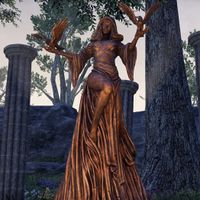Lore:Ur-dra
Ur-dra, also spelled as Ur-Dra,[2] or UR DRA,[3] is a title among the Daedric Princes.[4][5] Its exact meaning is unclear, but it is associated with great age, power, and authority.[1]
This title is most commonly associated with Nocturnal, the Night Mistress, who is, according to the Psijic Order, perhaps the eldest and most powerful of the Daedric Princes.[1] Both the Psijic Order,[1] and Sotha Sil,[5] along with his Factotums, acknowledge Nocturnal as Ur-Dra.[6][7] Imperial Geographical Society asserts that nearly all the royalty of Oblivion acknowledge Nocturnal's title,[UOL 1] as she has assumed the mantle of Ur-Dra of Oblivion.[UOL 2] It is also a sentiment echoed by Daedric Prince Nocturnal herself.[4]
The term Ur-Dra is also used in different contexts and attributed to other entities in various aspects of Khajiiti,[2][3] and Dunmeri theology.[8]
Amun-dro, the Silent Priest of the pre-ri'Datta Khajiiti faith, claimed that both Namiira,[2][3] and Azurah are Ur-Dra. According to him, Fadomai taught Azurah the names of all the spirits, enabling her to recognize the Great Darkness for what it was. As such, she was associated with the song "UR DRA NA MII RA UR DRA NA MII RA UR DRA AZU RA."[3]
In From Exile to Exodus, penned by Tarvyn Aram, it is asserted that Azura shouted a spell of her own during the confrontation between Boethiah and Malak. To the followers who truly listened, it sounded like a beautiful song: "UR DRA AMATHRA! FU ROZ ISA MAL AKHA!" With those words, which were a curse to some but a blessing to others, Boethiah, with her next expulsion, drew out Malak and discarded him along the stones.[8]
Notes[edit]
- Ur-Dra is not to be confused with Ur-Daedra, a title exclusively associated with the Daedric Prince Hermaeus Mora.[9][10][11]
- "Ur-" as a prefix can mean "proto-", "primitive", and "original".
- The ruins of Ebon Stadmont are carved with a mysterious language that resembles but isn't Daedric. This language, older than any other language on Nirn, has been theorized to predate even the language of Oblivion. Leythen, Earl of Mephala and chief linguist of the Psijic Order, also claimed the Ebon Standmont language and the Daedric power it was linked to were far older than his Prince, Mephala. The language has arcane properties which can only be used by mortals, as recitation of the script has transported people and objects through time and cast the spell with which Ritemaster Iachesis hid the Heart of Transparent Law. Nocturnal provided Iachesis a spell in this language, and the inscriptions in Ebon Stadmont are carved on structures featuring crows, which are symbols of Nocturnal. This might support Nocturnal's claims of being older than Oblivion and other Princes. [12][13][14][15]
References[edit]
- ^ a b c d Lilatha's dialogue in ESO
- ^ a b c Spirits of Amun-dro — Amun-dro, the Silent Priest
- ^ a b c d The Favored Daughter of Fadomai — Amun-dro, the Silent Priest
- ^ a b Nocturnal's dialogue in ESO: Blackwood
- ^ a b Sotha Sil's dialogue in ESO: Clockwork City
- ^ Sotha Nall's dialogue in ESO: Clockwork City
- ^ Aios's dialogue in ESO: Clockwork City
- ^ a b From Exile to Exodus — Tarvyn Aram
- ^ Secrets Overheard in Apocrypha — Morian Zenas
- ^ On the Pact Primordial
- ^ Torvesard and Hermaeus Mora's dialogue in ESO: Gold Road
- ^ Grand Maestro Forte's Research — Grand Maestro Forte
- ^ Leythen's dialogue in ESO
- ^ Events of The Ebon Sanctum questline in ESO: Summerset
- ^ Ritemaster Iachesis' dialogue in ESO: Summerset
Note: The following references are considered to be unofficial sources. They are included to round off this article and may not be authoritative or conclusive.
| ||||||||
